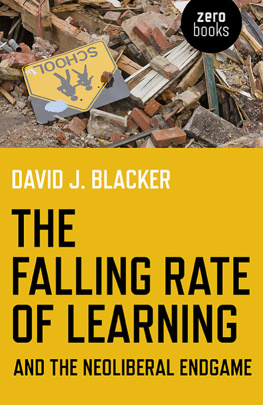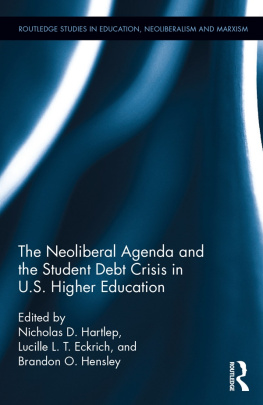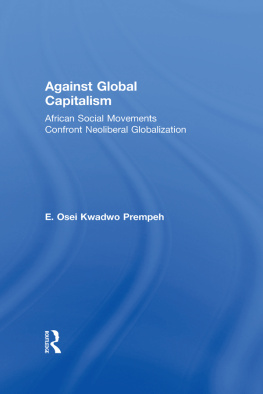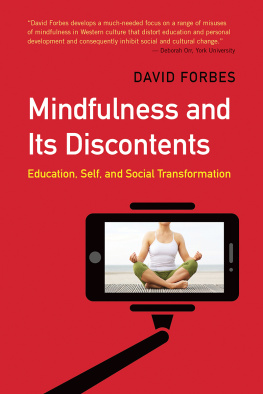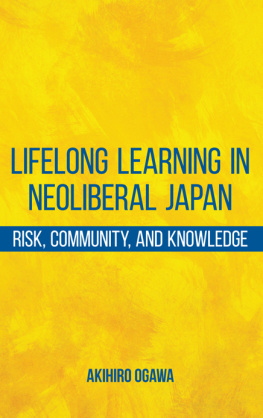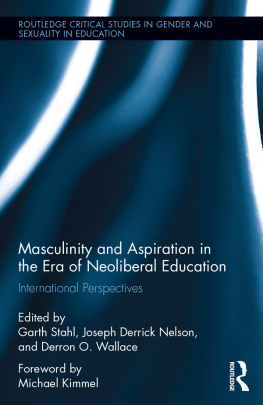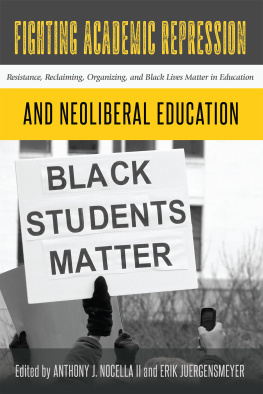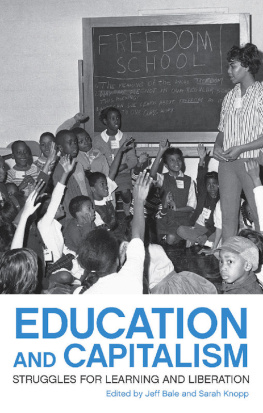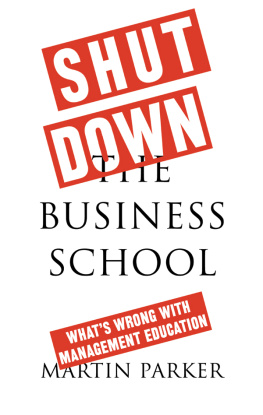Praise for
The Falling Rate of Learning and the
Neoliberal Endgame
by David J. Blacker
David Blacker provides a mordantly clear-eyed assessment of our predicament. He asks hard questions, in the tradition of our best gadflies, and reveals even harder truths, doing us and our democracy (such as it is) a great potential service. Read rightly, Blackers book, far from making you want to bury your head in the sand even deeper, will inspire you to shake yourself out of your slumber and do your part to arrest this pernicious development. We ignore his important work at our own peril.
Christopher Phillips, author, Socrates Cafe: A Fresh Taste of Philosophy and Constitution Cafe: Jeffersons Brew for a True Revolution, Senior Writing Fellow, University of Pennsylvania and founder, Democracy Cafe
While it is no surprise that casino capitalism is in crisis and is spurring protests all over the world, few theorists connect the dots and analyze how this crisis moves through and is affected by a range of institutions. David Blacker has written a superb book in which matters of education, agency, economic justice and collective struggle come alive in both a language of critique and possibility. There will be no endgame to neoliberalism without critically thinking subjects who fight back collectively. This is the book that should be read to create the formative culture that makes such a struggle possible.
Henry A. Giroux, author, Americas Education Deficit and the War on Youth and Youth in Revolt: Reclaiming a Democratic Future, Global Television Network Chair in Communication Studies at McMaster University, Ontario
Invigorating pessimism
Mark Fisher, author, Capitalist Realism: Is There No Alternative?
David Blackers book should be required reading for everyone marching circles in schools and universities.
Doug Lain, author, Billy Moon: 1968 and host of the Diet Soap Podcast
The notion that widespread educational attainment is the key to widespread prosperity has long been a pillar of the dominant ideology. David Blackers centraland centrally importantinsight is that the Great Recession has made this notion (which was always dubious) hopelessly anachronistic. When so many people have become superfluous to the capitalist system--mass joblessness persists four years after the recession officially ended--what have also become superfluous are these peoples skills, the schools that educate them, and the spending that funds the schools. And a capitalism mired in crisis just isnt a capitalism that can afford to pay for what it doesnt need. But isnt this only a temporary situation? Drawing on Karl Marxs falling-rate-of-profit theory and his associated theory of relative surplus (super-fluous) population, Blacker warns that it may well be permanent and he urges us to face this prospect soberly and respond accordingly.
Andrew Kliman, author, The Failure of Capitalist Production: Underlying Causes of the Great Recession, Professor of Economics, Pace University (New York)
First published by Zero Books, 2013
Zero Books is an imprint of John Hunt Publishing Ltd., Laurel House, Station Approach,
Alresford, Hants, SO24 9JH, UK
www.johnhuntpublishing.com
www.zero-books.net
For distributor details and how to order please visit the Ordering section on our website.
Text copyright: David J. Blacker 2013
ISBN: 978 1 78099 578 6
All rights reserved. Except for brief quotations in critical articles or reviews, no part of this book may be reproduced in any manner without prior written permission from the publishers.
The rights of David J. Blacker as author have been asserted in accordance with the Copyright,
Designs and Patents Act 1988.
A CIP catalogue record for this book is available from the British Library.
Design: Stuart Davies
Printed and bound by CPI Group (UK) Ltd, Croydon, CR0 4YY
We operate a distinctive and ethical publishing philosophy in all areas of our business, from our global network of authors to production and worldwide distribution.
Through wars and corruptions the house will fall.
Mourn whom it falls on. Be glad: the house is mined, it will fall.
-Robinson Jeffers
Preface
The current neoliberal mutation of capitalism has evolved beyond the days when the wholesale exploitation of labor underwrote the world systems expansion. While normal business profits plummet and theft-by-finance rises, capitalism now shifts into a mode of elimination that targets most of us - along with our environment - as waste products awaiting managed disposal.
The education system is caught in the throes of this eliminationism across a number of fronts: crushing student debt, impatience with student expression, the looting of vestigial public institutions and, finally, as coup de grce, an abandonment of the historic ideal of universal education. Education reform is powerless against eliminationism and is at best a mirage that diverts oppositional energies. The very idea of education activism becomes a comforting fiction.
Educational institutions are strapped into the eliminationist project - the neoliberal endgame - in a way that admits no escape, despite the heroic gestures of a few. The school systems that capitalism has built and directed over the last two centuries are fated to go down with the ship. It is rational therefore for educators to cultivate a certain pessimism. Should we despair? Why, yes, we should - but cheerfully, as confronting elimination, mortality, is after all our common fate. There is nothing and everything to do in order to prepare.
This book attempts a realistic assessment of what we are stuck with for the time being. Sold with hyperbolic fanfare, education reforms will continue: some for the better, some for the worse. We are in a period, though, where the really big changes are highly unlikely to be the products of individual or even collective volition. Those changes are coming, yes, but they will of necessity result from structural dynamics rather than volitional grit and determination.
In the meantime, we must wait. Not even the grandest experts can predict what comes next and when. This means that everyone, including the most ruddily optimistic and busiest of activists, must continually cope with existing systems even as conditions worsen. This is where an appreciation of fate can come in. Yet fate sounds intolerable to modern ears, as all we can hear is futility. But the conflation is false. The ancients understood how fate is tied to hope and the two must come together. As the first woman on earth, Pandora, discovered, hope may need to be surrendered before it is found.
Many people have aided this manuscript, including students and audiences in the US and UK who have been subjected to talks derived from bits and pieces of it. I deeply appreciate the good work of Tariq Goddard, John Hunt, Trevor Greenfield and Liam Sprod and others at Zero Books, an extremely cool operation with which Im very happy to be associated. Im especially grateful for the kind attentions of Bob Hampel, Chris Higgins, Doug Lain, Alpesh Maisuria, Curry Malott, Chris Martin, Chris Phillips, Andrew Ross and the Occupy Student Debt movement. Most of all, I thank Marcia Blacker, Jessica George and Aideen Murphy for their above-and-beyond-the-call critiques of both substance and style. Please dont blame any of these people of course; all they did was suggest I make the thing better than it would have been. Finally, I am grateful for permission to use, for portions of , substantially revised material from An Unreasonable Argument Against Student Free Speech,

